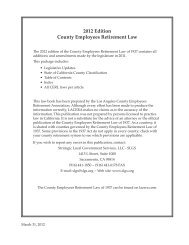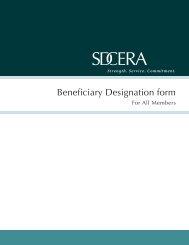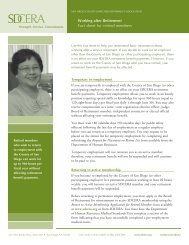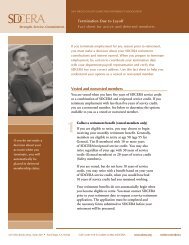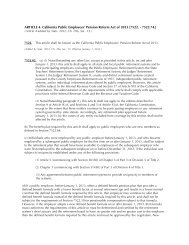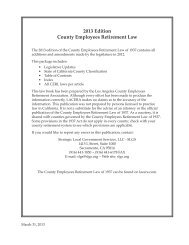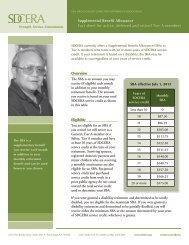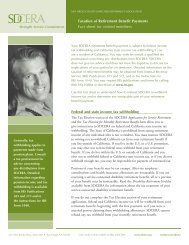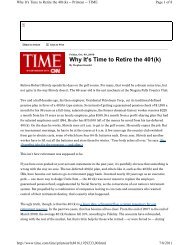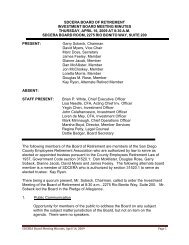Retirement Plan booklet - sdcera
Retirement Plan booklet - sdcera
Retirement Plan booklet - sdcera
Create successful ePaper yourself
Turn your PDF publications into a flip-book with our unique Google optimized e-Paper software.
16<br />
be eligible if you have ever taken an SDCERA refund following a<br />
previous period of employment, or if you worked for another public<br />
agency in California prior to your SDCERA membership. Read more in<br />
the Purchasing Service Credit fact sheet.<br />
Final compensation<br />
Final compensation is best thought of simply: It’s approximately what you<br />
earn in a one-year period while you are working. SDCERA calculates<br />
final average monthly compensation based on your highest one year<br />
(26 consecutive pay periods) of eligible earnings. The timeframe does not<br />
need to be within a fiscal year or a calendar year; rather, SDCERA uses<br />
your highest 26 consecutive pay periods.<br />
For most members, the last 26 consecutive pay periods are used because<br />
usually you earn at your highest pay rate at the time of your termination.<br />
However, if there is a time period in your employment history as an<br />
active SDCERA member when you were earning at a higher rate than<br />
the rate you earn at the time of your termination, SDCERA will use the<br />
26 consecutive pay periods that provide the highest amount.<br />
Gross, biweekly pay plus<br />
other select earnings categories<br />
are included in your final<br />
compensation calculation.<br />
Uniform allowance, bilingual,<br />
shift premium and Quality<br />
First payments are some common<br />
examples of eligible earnings<br />
categories. Overtime is not an<br />
eligible pay category and is not<br />
included. Visit the calculators page<br />
at www.<strong>sdcera</strong>.org to see the list<br />
of eligible categories.<br />
You receive a percentage of your final compensation as a retirement<br />
benefit. The percentage you receive is based on your age at retirement,<br />
total service credit and membership group (General or Safety).<br />
If you have established reciprocity (see page 7) your retirement benefit<br />
from all reciprocal systems will be based on your highest final average<br />
monthly compensation, regardless of which system you are working in<br />
when you earn the highest wage.



